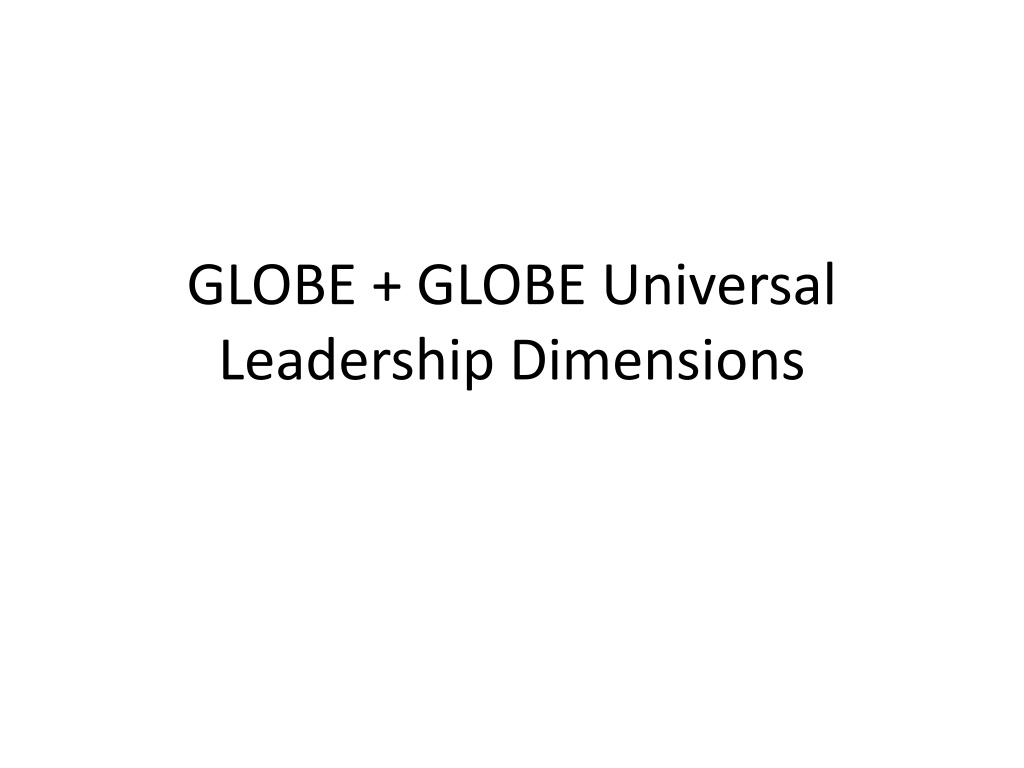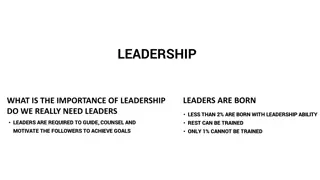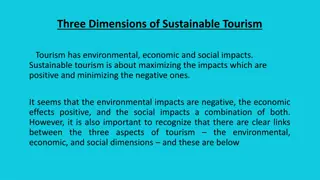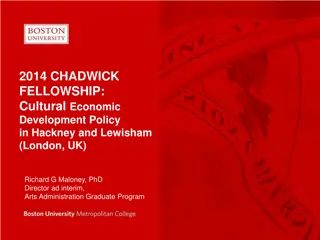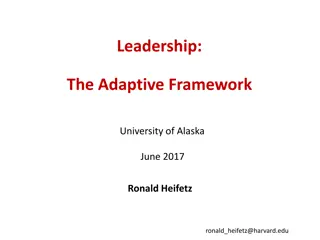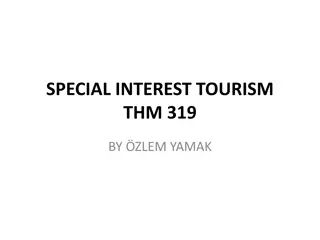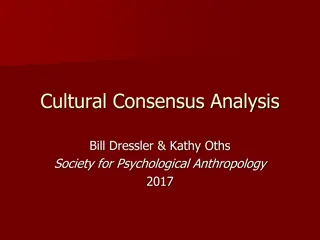Global Study of Cultural Dimensions in Leadership
Explore the comprehensive GLOBE study on cultural dimensions impacting leadership across 62 countries, highlighting values and practices in Germanic, Latin, and Anglo Europe. The research examines various aspects such as power distance, uncertainty avoidance, assertiveness, in-group collectivism, future orientation, humane orientation, gender egalitarianism, and institutional collectivism.
Download Presentation

Please find below an Image/Link to download the presentation.
The content on the website is provided AS IS for your information and personal use only. It may not be sold, licensed, or shared on other websites without obtaining consent from the author. Download presentation by click this link. If you encounter any issues during the download, it is possible that the publisher has removed the file from their server.
E N D
Presentation Transcript
GLOBE + GLOBE Universal Leadership Dimensions
GLOBE Study of Culture, Leadership, and Organizations in 62 Countries Survey Min Practices Survey Max Practices Culture Construct Definition Specific Question 3.89 5.80 The degree to which members of a collective expect power to be distributed equally Followers are (should be) expected to obey their leaders without question. Power Distance 2.88 5.37 The extent to which a society, org., group relies on social norms, rules, procedures to alleviate unpredictability of future events Most people lead (should lead) highly structured lives with few unexpected events. Uncertainty Avoidance 3.18 5.23 The degree to which a collective encourages and rewards individuals for being fair, altruistic, generous, caring , and kind to others People are generally (should be generally) very tolerant of mistakes. Humane Orientation 3.25 5.22 The degree to which org. and societal institutional practices encourage and reward collective distribution of resources and collective action Leaders encourage (should encourage) group loyalty even if individual goals suffer. Institutional Collectivism 3.53 6.36 The degree to which individuals express pride, loyalty, and cohesiveness in their organizations or families Employees feel (should feel) great loyalty toward this organization. In-Group Collectivism 3.38 4.89 The degree to which individual are assertive, confrontational, and aggressive in their relationships with others People are (should be) generallydominant in their relationships with each other. Assertiveness 2.50 4.08 The degree to which a collective minimizes gender inequality Boys are encouraged (should be encouraged) more than girls to attain a higher education [scored inversely] Gender Egalitarianism 2.88 5.07 The extent to which individuals engage in future- oriented behaviors such as delaying gratification, planning, and investing in the future More people live (should live) for the present rather than for the future. [scored inversely] Future Orientation 3.20 4.94 The degree to which a collective encourages and rewards group members for performance improvement and excellence Studentsare encouraged (should be encouraged) to strive for continuously improved performance. Performance Orientation
Germanic Europe Values & Practices Performance Orientation 7 6 Uncertainty Avoidance Assertiveness 5 4 3 In-group Collectivism Future Orientation 2 1 Power Distance Humane Orientation Gender Egalitarianism Institutional Collectivism Germanic Practices Germanic Values
Latin Europe Values & Practices Performance Orientation 7 6 Uncertainty Avoidance Assertiveness 5 4 3 In-group Collectivism Future Orientation 2 1 Power Distance Humane Orientation Gender Egalitarianism Institutional Collectivism Latin Europe Practices Latin Europe Values
Anglo Values & Practices Performance Orientation 7 6 Uncertainty Avoidance Assertiveness 5 4 3 In-group Collectivism Future Orientation 2 1 Power Distance Humane Orientation Gender Egalitarianism Institutional Collectivism Anglo Practices Anglo Values
Nordic Europe Values & Practices Performance Orientation 7 6 Uncertainty Avoidance Assertiveness 5 4 3 In-group Collectivism Future Orientation 2 1 Power Distance Humane Orientation Gender Egalitarianism Institutional Collectivism Nordic Europe Practices Nordic Europe Values
Eastern Europe Values & Practices Performance Orientation 7 6 Uncertainty Avoidance Assertiveness 5 4 3 In-group Collectivism Future Orientation 2 1 Power Distance Humane Orientation Gender Egalitarianism Institutional Collectivism Eastern Europe Practices Eastern Europe Values
Differences between Anglo and Latin Europe Business Practices Performance Orientation 6 5 Uncertainty Avoidance Assertiveness 4 3 2 In-group Collectivism Future Orientation 1 Anglo Practices 0 Latin Europe Practices Power Distance Humane Orientation Gender Egalitarianism Institutional Collectivism
Universal Leadership THE MEANING OF "UNIVERSAL": Universal Positive: To be universally endorsed as contributing to effective leadership, an attribute had to meet both of two criteria: (a) 95% of the societal averages had to exceed a mean of 5 on a 1- to-7 scale (on which 7 is high), and (b) the worldwide grand mean score for that attribute (considering all 62 cultures together) had to exceed 6 on a 1-to-7 scale.
Universal Leadership Dimensions Charismatic/Value-Based the ability to inspire, to motivate, and to expect high performance outcomes from other based on firmly held core values. Team Orientation Emphasis on effective team building and implementation of a common purpose or goal among team members. Participative Reflects the degree to which managers involve others in making and implementing decisions. Humane Oriented Reflects supportive and considerate leadership but also includes compassion and generosity. Autonomous - A newly defined leadership dimension that refers to independent and individualistic leadership attributes. Self-Protective - A newly defined leadership dimension from a Western perspective. Focuses on ensuring safety and security of the individual and group through status enhancement and face-saving. 10/3/2024 10
Universal Leadership Dimensions Sub Scales Charismatic/Value-Based vision, inspirational, self-sacrifice, integrity, decisiveness, and performance-oriented Team Orientation collaboration, team integration, diplomatic, malevolent (reverse scored), and administratively competent Participative non-participative and autonomous (both reverse scored) Humane Oriented modesty and humane orientation Autonomous - individualistic, independent, autonomous, and unique Self-Protective - self-centered, status conscious, conflict inducer, face-saver, and procedural 10/3/2024 11
